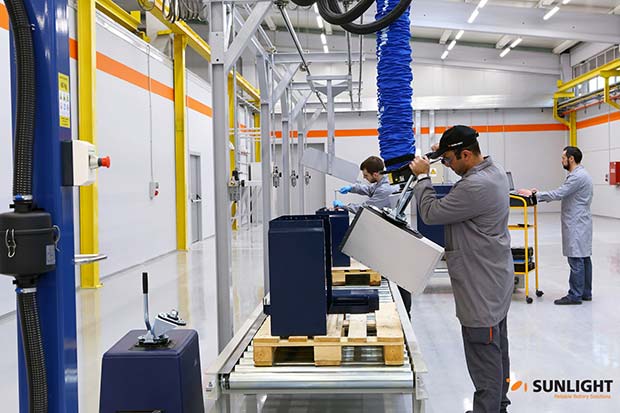Roberto Denti, Chief Operations Director at Systems Sunlight, a leading technology company in the production of batteries for the energy storage industry.
 Covid-19 has had a profound impact on the consumer landscape. According to Grand View research, the global e-commerce market is expected to grow at a compound annual rate (CAGR) of 14.7% from 2020-2027.
Covid-19 has had a profound impact on the consumer landscape. According to Grand View research, the global e-commerce market is expected to grow at a compound annual rate (CAGR) of 14.7% from 2020-2027.
Faced with a demand that shows no sign of stopping, the warehouse and logistics industry has been met with increasing pressure to carry out multi-shift operations with optimum efficiency. It is therefore vital that warehouses review current equipment for inefficiencies and use technological advances in equipment and materials to their advantage.
When assessing the efficiency of a warehouse it is important to understand the performance limits of your equipment. Ageing forklifts that are no longer running at the efficiency required may need to be serviced or replaced to keep up with high demand. However, it is also important to understand how components of the product may be hindering its performance. In particular, its power source: the battery. The right battery can have a significant impact not just on performance but on the footprint of the warehouse and running costs.
For warehouses which operate multi-shift operations, it is worth considering investing in lithium-ion batteries. Although the product has a higher upfront cost than alternatives, lithium batteries require less time to charge and do not rely on watering, cleaning and equalising. Unlike other forms of batteries, the performance of forklifts will not start to deteriorate as the lithium batteries run out of power. Sunlight’s Li.ON force range incorporates a state of charge display which provides low battery warning signals to prevent forklifts running out of charge in the middle of a busy warehouse floor.
In times of high demand, it is important to reduce the idle time of equipment. High energy density coupled with quick recharge times mean that lithium-ion batteries can accommodate multiple shifts whilst also significantly reducing downtime. At Sunlight, our Li.ON force lithium-ion batteries reach full charge in under 90 minutes, allowing for three shift operations without the need for battery change in the middle of the working day. This also negates the need for a second ‘on charge’ battery, which further reduces the footprint, allowing for more space for product storage.
To enable the constant flow of product distribution, it is important to limit the amount of maintenance and servicing required for warehouse equipment. We recommend looking for products from energy storage manufacturers that allow warehouse management systems (WMS) integration which enables warehouse managers to monitor the batteries and pre-empt any issues. Our Li.ON range goes one step further, as the first range on the market to incorporate cloud access as standard, our network of engineers can remotely access the batteries to shut down a damaged module or increase charge significantly reducing unnecessary downtime associated with faulty or low power forklifts.
As the world continues to adapt to new ways of living, demand for e-commerce services isn’t going away any time soon. Yet introducing technologies such as lithium-ion batteries are a simple way of ensuring maximum efficiency and productivity. By selecting a battery that features in built WMS integration, cloud access and clear state of charge displays from a trusted manufacturer such as that provided by Sunlight, warehouses can provide a fast and reliable service to their customers, especially in these challenging times.
For further information on System Sunlight’s Li.ON range, please visit: www.systems-sunlight.com




Comments are closed.